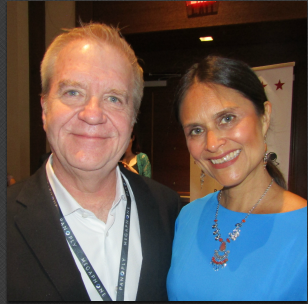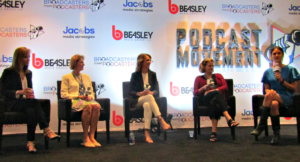
That was the sense we got on more than one occasion at Podcast Movement this week. In fact, when one of the most successful podcasters, Elsie Escober (pictured here with Beasley’s Buzz Knight), moderated a panel of radio executives, here’s what she had to say…
Escobar let the panel know that there was a general feeling amongst podcasters that radio was, all of a sudden, attempting to invade their space. She was moderating a panel that included Hubbard CEO Ginny Morris, Premiere Radio’s Julie Talbot, Westwood One’s Suzanne Grimes, and Beasley CEO Caroline Beasley. Escobar said, “We’ve felt afraid of radio coming onto the scene.” She said she, and her fellow podcasters, were worried that radio was going to come along and tell them all what to do. They wondered: “What are they doing here? This is our space?”
It’s a legitimate question. Until recently radio has been someone slow to fully embrace podcasting. In addition to always having to focus on its core audience and delivering strong results to advertisers with their over-the-air product, radio also had to worry about pushing its audience away from traditional listening. Plus, how much more time can their hosts put in creating new content and not get paid for it. There are also serious measurement issues with podcasting and no clear way for consumers to find podcasts easily. 
However, now that the radio industry sees money flowing into the medium, they have put both feet in the podcasting pool. The IAB estimates that $402 million will be spent on podcasting this year, and many believe that estimate is too low. The four executives Escobar was interviewing have made it clear they are on the podcast bandwagon. Hubbard made a significant investment in PodcastOne years ago. Westwood recently launched a podcast network. Premiere and iHeart are now pushing out podcasts on iHdeartRadio. And, Beasley not only sponsored part of Podcast Movement, the company is also launching a new podcast initiative in Q4.
In addition to being taken aback that podcasters were somewhat frightened of broadcasters, all four executives tried to put Escobar’s fears at ease. They told her they were there as much to learn as they were to share their expertise in the audio space.
Morris said Hubbard views audio entertainment as an ecosystem. “The magic of podcasting is the individuality. As the space grows, all boats will rise.” Beasley said the relationship can be a win-win for both sides. “Podcasters are very successful. We want to be successful as well. Broadcasters may be able to you get your shows out.” Grimes actually said she was shocked to hear how podcasters felt they were being invaded by radio, and added: “Only 19% of consumers listen to podcasts. There is a ton of room to grow. We bring another opportunity to get the world to know you. It could be an excellent formula to write the next chapter.”
In the end Escobar said she felt better about the relationship after discussing it with the radio executives. “We can start to help each other.”






Trust your instincts Elsie. Radio is sizing you up for the kill. It’s what they do. All day, everyday.
Heads up, Elsie Escobar’s name is spelled wrong in the first paragraph.
In response to Dave Sanders:
I am a multimedia designer for Beasley Media Group. I do graphic design for station brands, events, philanthropic campaigns and more. I also get to execute web design projects (bbgi.com for example) and work on UX / UI for our digital products such as apps, websites, etc.
I can understand your frustration. Growing pains are… well… painful. Radio is in the midst of a transformation from being “radio companies” to “media companies” trying to reach new audiences in new digital spaces from social media platforms to mobile apps to in-home audio devices like Alexa. This transformation is a complex process with tough logistical challenges and event tougher cultural shifts.
The radio industry is not dead but the way we have viewed our industry for the past five decades must die in order to march forward. There is a promising future but we must listen to our industry’s youth, the up-and-comers, who have new perspectives and new ideas on the possibilities of where our industry can go.
Radio executives continue to demonstrate their capacity and their proclivity to: take a good thing – and screw it up.
Any proferred suggestions that radio leadership is “willing to learn” can be described as just another example of flapping dog lips.
What they really want, in my estimation, is to hook into the podcasting concept without providing the necessary quality of content – and to do so for a buck, ninety-five. Less, if they can pull it off.
Talent has grown weary of the constant “down the road” assurances.
Most podcasters are doing it because they are diggin’ it, and for the possibility, maybe, of making some coin.
A sincerity-check is in order.
If she thinks radio is invading podcasting for the good of the medium, she’s in for a rude awaking. Radio refuses to invest in creativity and content in their existing business model, but now suddenly want to jump into what is essentially talk radio…. a format they claim is dead and too labor intensive for broadcast.
Good luck with that.
Podcasting would be good to kick the radio execs back out onto the curb…. they have little of value to contribute to a new medium.